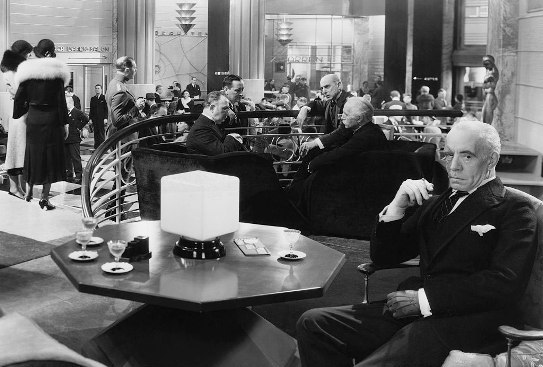 MGM’s star-studded 1932 film typifies classic Hollywood style.
MGM’s star-studded 1932 film typifies classic Hollywood style.
In what we now call the classic era of Hollywood film, Metro-Goldwyn-Mayer (MGM) had more stars than any other studio. In 1932, as if to prove that fact, production chief Irving Thalberg put a whole bunch of them in one big movie called Grand Hotel. The result typifies the period of Hollywood glamour, and it ended up winning the Oscar for Best Picture.
Grand Hotel was based on a play, and that in turn was based on a Vicki Baum novel about two days in the life of a Berlin luxury hotel. Although the script relies heavily on the stage version by William Drake, a good deal of it was hammered out by Thalberg and director Edmund Goulding in order to custom fit the movie to its stars.
John Barrymore plays a kind, world-weary baron, in deep financial trouble, who has promised his creditors that he will steal the jewels of a famous ballerina (played by Greta Garbo) to pay his debt. Of course, he falls in love with her instead. Wallace Beery plays a philistine industrialist trying to swing a business deal, who has lecherous designs on a young stenographer played by Joan Crawford. Meanwhile, one of the industrialist’s lowly employees, played by Lionel Barrymore, is living in style on his life savings, now that he knows that he’s terminally ill. Perennial character actors Lewis Stone and Jean Hersholt are also on hand in supporting roles.
The underappreciated director, Goulding, simulates a cosmopolitan atmosphere very nicely, and the stories interweave with a pleasant smoothness. John Barrymore takes his rather sketchy character and gives him a heart—there’s a genuine sadness and delicacy in his portrayal. But it’s Garbo who really adds that special element to the movie that makes it work. Her flighty, indolent, and temperamental character is almost a parody of her own silent screen image, and yet there’s something terribly poignant about her childlike romanticism. Wallace Beery is excellent as the brutish businessman Preysing, and Joan Crawford, on the threshold of the stardom that would make her the queen of the lot at MGM, is charming and lovely. Those who only know her from her later work should look instead at her Metro films in order to understand why she was so popular.
This classic film is the ancestor, in a way, of all the stories with interlocking characters and plots that have become prominent in recent years. It has that old Hollywood quality of artifice that is so hard to resist—the great set that duplicates the majesty of a Berlin hotel, the wonderful costumes, the finely textured photography by William Daniels. It’s a story of romantic notions running up against the harsh realities of life, and it’s a wonder that Goulding managed to transport some of the source’s old-world melancholy into an American film. Watching Grand Hotel is like seeing an entire bygone era of movies wrapped up in one bittersweet confection.

A drama about the evolution of a motorcycle group in the ’60s, from club to gang. Jeff Nichols’ films are known for their gritty...

Elegance Bratton’s autobiographical film dramatizes what it was like to be a gay Marine during “Don’t Ask, Don’t Tell.” A young black man is...

The true story of a Japanese officer who stayed on a small Pacific island for thirty years, believing that the second World War was...